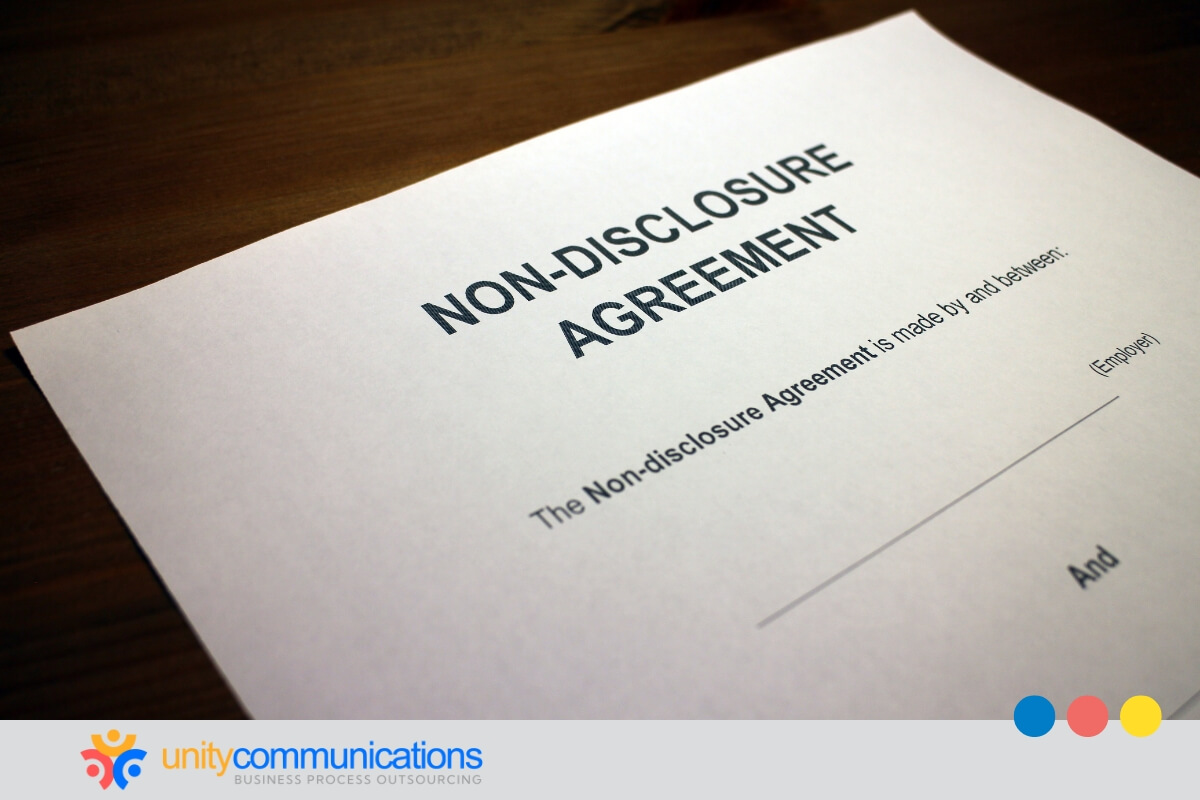Table of Contents
Outsourcing content creation can be a strategic move to scale efficiently, tap into specialized expertise, and maintain a steady flow of high-quality content. However, business process outsourcing (BPO) poses significant risks without legal safeguards.
This guide explores the essential legal considerations every business must address in content outsourcing. From protecting ownership rights to ensuring regulatory compliance and drafting airtight contracts, we’ll walk you through the key steps to mitigate risks and safeguard your business interests.
Legal consideration in content creation outsourcing

Businesses must navigate several legal considerations in content outsourcing to protect interests and comply with relevant laws. One critical aspect is intellectual property (IP) ownership. Confidentiality and data protection are significant concerns, especially if the outsourced content involves proprietary information or customer data.
Compliance with regulations is another crucial factor. Depending on the industry and type of content, businesses must adhere to copyright laws, advertising regulations, and data security standards. Failure to comply can result in legal penalties or reputational damage.
What BPO clients must do to mitigate risks is to conduct thorough due diligence on service providers, verifying their credibility and familiarity with relevant legal requirements.
Here are legal considerations in content outsourcing to take note of:
Drafting comprehensive outsourcing contracts
Drafting a comprehensive contract is an essential legal consideration in content outsourcing. The contract should clearly define ownership rights to ensure the business owns all IP produced under the agreement upon completion and payment. Conversely, companies should include a “work for hire” clause.
Outsourcing partners might retain rights to the work without this provision, potentially leading to disputes over usage and distribution. Additionally, the agreement should specify confidentiality obligations, preventing freelancers or agencies from disclosing confidential business information.
To mitigate risks, include detailed expectations regarding content quality, deadlines, and revisions. A well-defined scope of work minimizes misunderstandings and aligns both parties on deliverables. Explicitly outline payment terms, covering rates, invoicing procedures, and any penalties for missed deadlines or subpar work.
Moreover, to protect the client company from legal liabilities, address compliance with relevant laws, such as copyright regulations, data privacy standards, and industry-specific requirements.
By crafting a thorough contract that covers these key elements, businesses can safeguard their interests, foster productive collaborations, and achieve a smooth outsourcing process.
Managing dispute resolution in outsourcing contracts
A dispute resolution clause in BPO contracts protects your business and promotes a structured approach to handling conflicts. Disputes can arise over missed deadlines, content quality, IP ownership, or payment disagreements. By specifying a clear resolution process in the contract, companies can prevent costly and time-consuming legal battles.
A detailed dispute resolution mechanism should outline both parties’ steps to resolve conflicts. It is advisable to start with negotiation, requiring both sides to attempt an amicable settlement before escalating the matter.
If negotiation fails, mediation can serve as the next step, involving a neutral third party to facilitate discussions and help reach a mutually agreeable solution. As a final measure, arbitration can be a binding or non-binding resolution method. This offers a more cost-effective and private alternative to litigation.
Additionally, the contract should specify the governing law and jurisdiction to avoid confusion over which legal system applies in case of a dispute. This is particularly important when outsourcing to international contractors, as laws might differ across regions.
By incorporating this legal consideration in content outsourcing, businesses can protect their interests, reduce legal risks, and ensure a smoother BPO experience.
Establishing clear confidentiality agreements
Establishing clear confidentiality agreements is an essential legal consideration in content outsourcing. Service providers might gain access to proprietary data, marketing strategies, unpublished content, or customer details. Setting strict confidentiality terms is essential.
The most effective way to ensure this protection is through a well-drafted non-disclosure agreement (NDA), which legally binds the service providers from sharing, using, or profiting from confidential information.
The NDA should explicitly define what constitutes confidential information, including trade secrets, unpublished works, business plans, and any data shared during the collaboration. It should also specify the duration of confidentiality obligations so restrictions remain in place even after the project ends.
Additionally, the agreement should outline the consequences of a breach, such as financial penalties or legal action, to deter unauthorized disclosures.
Beyond NDAs, businesses should also implement best practices such as granting limited access to sensitive data, using secure communication channels, and regularly reviewing compliance.
Complying with data privacy regulations
Data privacy compliance is an essential legal consideration in content outsourcing, especially if the work involves handling customer data, proprietary business information, or personal details. Different regions have strict privacy laws, such as the EU’s General Data Protection Regulation (GDPR) and the California Consumer Privacy Act (CCPA) in the U.S.
Failure to comply with these regulations can result in legal penalties, reputational damage, and loss of customer trust. The penalty for GDPR can reach up to 20 million euros or, for a business entity, up to 4% of its total global revenue from the previous fiscal year, whichever amount is greater.
Businesses should verify that service providers understand and adhere to relevant data privacy laws to mitigate these risks. A key step is incorporating data protection clauses in outsourcing contracts, clearly outlining how to collect, store, process, and dispose of personal or sensitive information.
If content creation involves handling customer information, businesses should require providers to follow encryption protocols, use secure communication tools, and restrict data access to only what is necessary. Additionally, requiring content creators to sign a data processing agreement can help promote compliance by legally binding them to data protection standards.
Regular audits and monitoring can further strengthen compliance efforts. Businesses can detect potential risks early and address them proactively.
Addressing cross-border legal challenges
Outsourcing internationally has many benefits, including a 70% labor cost reduction. However, it poses some legal challenges. Addressing cross-border legal issues is an essential legal consideration in content outsourcing.
Countries have varying laws regarding IP rights, data privacy, contract enforcement, and taxation, which can create legal uncertainties if not correctly managed. To manage them, businesses should first research and understand the legal frameworks governing outsourcing in their country and the contractor’s location.
The outsourcing agreement should specify the governing law and jurisdiction to clarify which legal system will apply in case of disputes. They can also adapt confidentiality agreements, such as NDAs, to align with international privacy laws to safeguard sensitive business information.
To further reduce legal risks, companies can work with legal professionals specializing in cross-border contracts or partner with outsourcing providers experienced in compliance.
The bottom line

Outsourcing content creation can be a valuable strategy, but it comes with legal responsibilities that should not be overlooked. Businesses can safeguard their interests and minimize risks by addressing legal considerations in content outsourcing, such as IP ownership, confidentiality, dispute resolution, and data privacy compliance.
A well-drafted contract, reinforced by clear agreements and compliance measures, ensures that outsourced content aligns with legal requirements and business objectives. Taking proactive steps to protect your company legally will prevent costly disputes and foster successful and secure collaborations.
Unity Communications is transparent in its processes, adhering strictly to legal requirements and data protection regulations while delivering exceptional service. To learn more about our commitment to outsourcing compliance and explore our engagement model, let’s connect!




